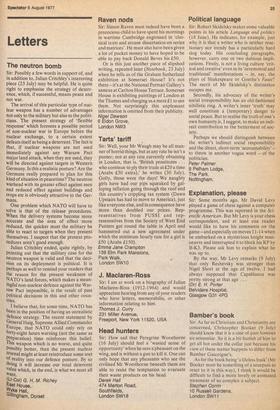The neutron bomb
Sir: Possibly a few words in support of, and in addition to, Julian Critchley's interesting piece (23 July) may be helpful. He is quite right to emphasise the strategy of deterrence, which, if successful, means peace and not war.
The arrival of this particular type of nuclear weapon has a number of advantages not only to the military but also to the politicians. The present strategy of 'flexible response' which foresees a possible period of non-nuclear war in Europe before the nuclear exchange, to a certain extent defeats itself as being a deterrent. The fact is that, if nuclear weapons are not used immediately against any Warsaw Pact major land attack, when they are used, they will be directed against targets in Western Germany. Is this a realistic posture? Are the Germans really prepared to plan for this kind of situation in peacetime? The neutron warhead with its greater effect against men and reduced effect against buildings and crops etc is obviously attractive to the Germans.
One problem which NATO will have to solve is that of the release procedures. When the delivery systems become more accurate and the area of effect more reduced, the quicker must the military be able to react to targets when they present themselves. I suspect that the present procedures aren't good enough.
Julian Critchley ended, quite rightly, by Pointing out that the military case for the neutron weapon is valid and that the decision on its deployment is political. It is Perhaps as well to remind your readers that the reason for the present weakness of NATO's land forces, which makes a meaningful non-nuclear defence against the Warsaw Pact impossible, is the result of past Political decisions in this and other countries.
I believe that, for some time, NATO has been in the position of having an unrealistic defence strategy. The recent statement by General Haig, Supreme Allied Commander Europe, that NATO could only rely on forty-eight hours warning (not the same as Preparation) time reinforces this belief. This weapon which is no worse, and quite Possibly better, than the present nuclear arsenal might at least reintroduce some sort Of reality into our defence posture. By so doing it will increase our total deterrent value which, in the end, is what we must all Want.
(Lt-Co/) G. H. M. Richey East House, Wyke Hall, Gillingham, Dorset










































 Previous page
Previous page